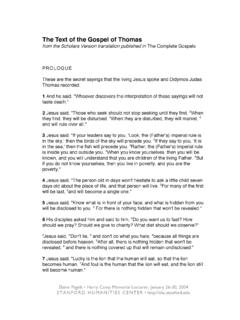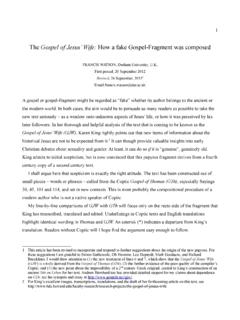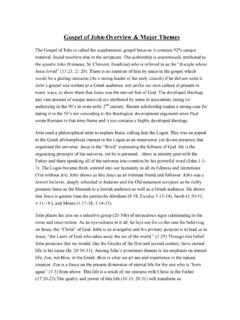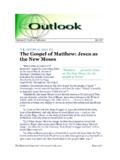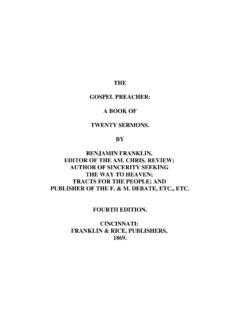Transcription of The Gospel Truth about the Negro Spiritual
1 The Gospel Truth about the Negro Spiritual A Lecture-Recital Presented by Randye Jones, Soprano & Researcher Assisted by William Tinker, Piano Grinnell College Grinnell, Iowa Tuesday, November 13, 2007 The Gospel Truth about the Negro Spiritual 2 The Gospel Truth about the Negro Spiritual By Randye Jones In a 2003 interview, the author was asked, What is the difference between Negro spirituals and Gospel music? It seemed like a simple question, but it was immediately apparent that the answer was far from simple.
2 First, it is complicated by the fact that both exist due to the deep-seated need of a people to express their faith in song. Secondly, composers of one style have used the other for source material, and musicians have often used performance practices of one when singing or playing the other. Also, the history of one style blends into the other. The times and environment in which the Spiritual was nurtured were starkly different than the incubator of black Gospel music. Gospel music is clearly rooted in the Spiritual , and Gospel musicians have certainly drawn on the Spiritual for source material.
3 But what is the Gospel Truth ? Are Gospel songs simply jazzed-up spirituals? This paper proposes to look briefly at the history and performance practices of each music style and a few of the many musicians who contributed to their development. Its goal is to seek out the Gospel Truth about what makes the two styles similar and what makes them different. The Negro Spiritual : From Cotton Field to Concert Hall A Brief History Negro spirituals are songs created by the Africans who were captured and brought to the United States to be sold into slavery.
4 This stolen race was deprived of their languages, families, and cultures; yet, their masters could not take away their music. Over the years, these slaves and their descendents adopted Christianity, the religion of their masters. They re-shaped it into a deeply personal way of dealing with the oppression of their enslavement. Their songs, which were to become known as spirituals, reflected the slaves need to express their new faith: My people told stories, from Genesis to Revelation, with God s faithful as the main characters.
5 They knew about Adam and Eve in the Garden, about Moses and the Red Sea. They sang of the Hebrew children and Joshua at the battle of Jericho. They could tell you about Mary, Jesus, God, and the Devil. If you stood around long enough, you d hear a song about the blind man seeing, God troubling the water, Ezekiel seeing a wheel, Jesus being crucified and raised from the dead. If slaves couldn t read the Bible, they would memorize Biblical stories they heard and translate them into The songs were also used to communicate with one another without the knowledge of their masters.
6 This was particularly the case when a slave was planning to escape bondage and to seek freedom via the Underground Railroad. 1 Velma Maia Thomas. No Man Can Hinder Me: The Journey from Slavery to Emancipation through Song (New York: Crown Publishers, 2001), 14. The Gospel Truth about the Negro Spiritual 3 Spirituals were created extemporaneously and were passed orally from person to person. These folksongs were improvised as suited the singers.
7 There is record of approximately 6,000 spirituals or sorrow songs; however, the oral tradition of the slaves ancestors and the prohibition against slaves learning to read or write meant that the actual number of songs is unknown. Some of the best known spirituals include: Sometimes I Feel Like a Motherless Child, Nobody Knows The Trouble I've Seen , Steal Away, Swing Low, Sweet Chariot, Go Down, Moses, He s Got the Whole World in His Hand, Every Time I Feel the Spirit, Let Us Break Bread Together on Our Knees, and Wade in the Water.
8 With the Emancipation Proclamation in 1863 and the conclusion of the American Civil War in 1865, most former slaves distanced themselves from the music of their captivity. The Spiritual seemed destined to be relegated to mention in slave narratives and to a handful of historical accounts by whites who had attempted to notate the songs they heard. Two of the most significant of these accounts are found in Thomas Wentworth Higginson s Army Life in a Black Regiment, which recounted the slave songs he heard the black Union soldiers sing, and the 1867 publication, Slave Songs of the United States.
9 In the preface of Slave Songs, compiler William Francis Allen described the difficulty they had recording the spirituals they heard: The best that we can do, however, with paper and types, or even with voices, will convey but a faint shadow of the original. The voices of the colored people have a peculiar quality that nothing can imitate; and the intonations and delicate variations of even one singer cannot be reproduced on paper. And I despair of conveying any notion of the effect of a number singing together, especially in a complicated shout, like I can t stay behind, my Lord (No.)
10 8), or Turn, sinner, turn O! (No. 48). There is no singing in parts, as we understand it, and yet no two appear to be singing the same thing the leading singer starts the words of each verse, often improvising, and the others, who base him, as it is called, strike in with the refrain, or even join in the solo, when the words are The performance of spirituals was given a rebirth when a group of students from newly founded Fisk University of Nashville, Tennessee, began to tour in an effort to raise money for the financially strapped school.

